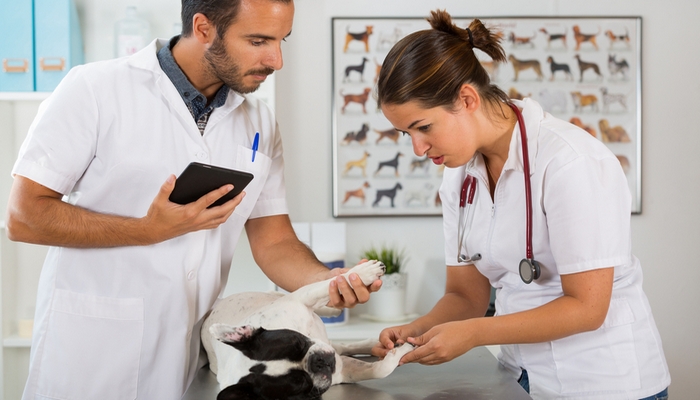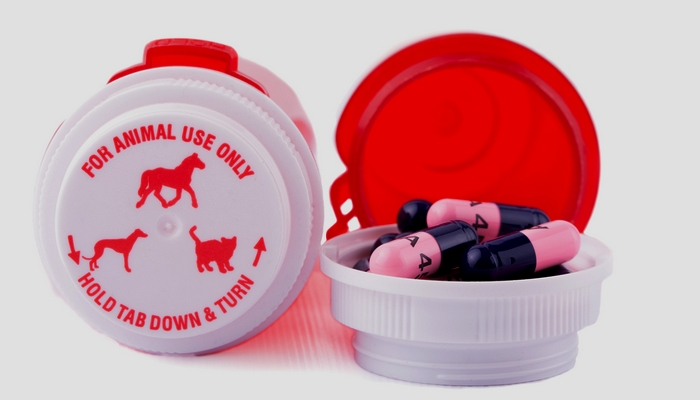Owning a pet gets expensive, but you need to be prepared to financially care for him no matter what happens. This means budgeting for veterinary bills – both expected and unexpected.
 A quick check up probably won't be that expensive, but most procedures will end up costing hundreds of dollars. There are some tips for saving money on vet bills that may help you stick to your budget. That means more money for dog treats!
A quick check up probably won't be that expensive, but most procedures will end up costing hundreds of dollars. There are some tips for saving money on vet bills that may help you stick to your budget. That means more money for dog treats!
These tips aren't meant to encourage you to skimp on veterinary care for your pet. Not taking your dog to the vet when he needs care is UNACCEPTABLE! As a dog owner, you need to have some money set aside in savings in case your dog needs emergency veterinary care.
I'm sharing these tips for saving money on vet bills to help you get the best bang for your buck. Some of these tips are simple. but many pet parents don't realize they have the option. They may only help you shave a few bucks off each bill, but that will add up to big savings in the long run.
7 Tips on How to Save Money on Vet Bills
1. Preventative Care
Maintaining a healthy lifestyle is the best way to save money on your veterinary expenses. Many vet visits are preventable. Did you know that more than 50% of pets in the U.S. are overweight or obese? This leads to thousands of unnecessary vet visits each year!
Being overweight puts your dog at a higher risk of developing diabetes, arthritis and even certain types of cancer – all of which will be extremely expensive to treat or control. Dental care is another common preventative measure that can drastically reduce your dog's risk of disease later in life.
A few minutes walking your dog and brushing his teeth each day could add up to thousands of dollars in savings over the course of his life. If you ask most pet parents why they don't walk their dog or take care of his teeth, they'll probably tell you they don't have time. Maybe they would rethink that if they understood the negative health effects it could have on their canine companion.
2. Try a veterinary college
This is one of the tips for saving money on vet bills that many dog owners don't think of. Veterinary college students need to practice on live animals. Not only do these students already have hours of lab time and instruction under their belts, they also have a well trained veterinary expert coaching them every step of the way.
RELATED: 8 Resources for Choosing the Best Veterinarian
You won't be able to get emergency services, but they may offer some of the most common procedures including annual exams, spaying and neutering and vaccinations. This is a great way to decrease your veterinary care budget and help students working toward their degrees. It's a win-win!
3. Be honest with your vet about your budget
Yes, this can be one of the most difficult tips for saving money on vet bills, but it may be worth it. Explain your financial situation, and see if your vet can help. Sometimes there are cheaper medications or procedures that will have the same effect.
Your vet may also be able to recommend a home remedy or natural remedy that would save you on costly prescriptions. Not everyone veterinarian will do this, so perhaps you need to shop around for a vet that is more interested in your dog's overall health and well-being than money.
4. Request an estimate
This is just an estimate, but it will save you from a surprise later on. If possible, request the estimate in writing. Then you'll be able to see the break down of services and what exactly it is you're getting charged for. If you have any questions on the charges you'll be able to ask before anything is done to your dog.
5. Price shop for prescriptions
Take it from someone who knows. We have a 5-year old boxer who has been diagnosed with a congenital heart condition. She takes 5 pills everyday to regulate her heartbeat. These prescriptions cost us more than $120 each month, but I price shopped and some pharmacies were going to charge us more than twice that much!
Typically, big box and chain pharmacies buy their medications in bulk and are able to pass that savings on to their customers. Likewise, many pharmacies now have savings programs specifically for pet prescriptions.
The pharmacy that we have calls their program the “Pet Meds” program, and it saves us nearly $80 each month – that's almost $1,000 dollars every year!
6. Feed a high quality diet
When discussing tips for saving money on vet bills, you can't overlook your dog's diet. Poor nutrition is one of the leading causes of canine health problems. Many dog owners don't realize that most commercial dog foods are full of artificial ingredients, chemicals and fillers with little to no nutritional value.
Just a quick chat with your veterinarian can explain how horrible some of the most popular dog food brands can be for your dog's health. Many owners don't want to spend the money for a better quality food, but it will actually save you money in the long run. Your dog's health is directly related to his diet, and the healthier your pup, the less trips to the vet you'll need to make.
RECOMMENDED READ: 3 Common Canine Diseases Linked to Dog Food
7. Consider purchasing pet insurance
If you're looking for the best tips for saving money on vet bills, pet insurance is going to pop up every time. To some pet owners it seems silly, to others it seems like an unnecessary expense. Like our own health insurance, you won't truly appreciate having pet insurance until you need it.
Imagine what you would do if your dog needed emergency surgery because he ate something toxic or a piece of one of his chew toys got lodged in his intestines. These are common issues that happen all the time, and your dog is not exempt from having an emergency. How would you pay for a surgery like this?
A few of us may be able to afford this type of procedure, but most of us would turn to a credit card or family member to borrow money. You wouldn't need to do that if you had pet insurance. This small monthly expense is the best way to save on veterinary costs, and it is likely to save you thousands of dollars over the course of your dog's life.
















